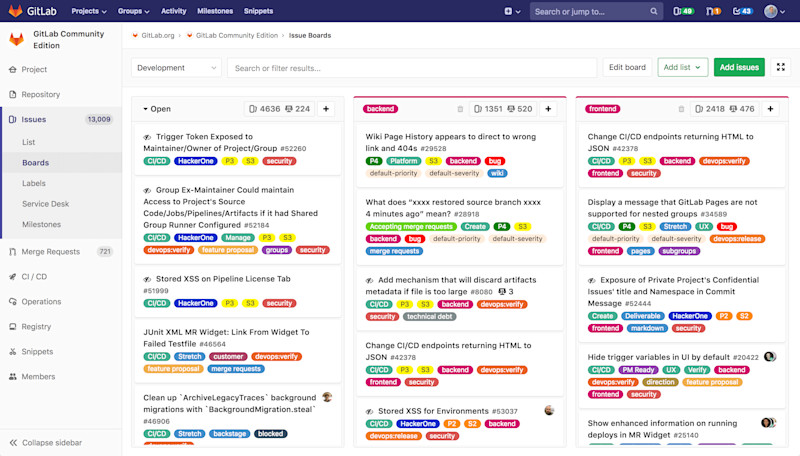- Iterate
- Meet The Team
- GitLab: The World’s Most Transparent Company
The company has become largest all-remote organization in the world, with close to 1,300 employees in over 65 countries, and works with 100,000 organizations and an estimated 30 million registered users. In 2019, it raised a $268M Series E round, and there are rumblings of an IPO in 2021. Talk to anyone at GitLab and it becomes apparent that the values in the team handbook, which, if printed, would be over 8,000 pages of text, is a huge part of that growth.

In January 2017, GitLab, the open-source DevOps platform, suffered a cyber attack. The team quickly went in to fix the issue, but in that process, an engineer accidently deleted GitLab’s production database. Six hours’ worth of issue and merge request data was lost. For a company that builds software tools for some of the largest businesses in the world, this was a major problem, so much so that the accidental deletion was on the front page of .
At the same time, a technical director working in Cambodia named Lyle Kozloff was looking for a new job. The work he was doing for an international non-profit was fulfilling, but as time went on, he realized that he was looking to work for a company with values more central to their business.
When Lyle opened Hacker News and saw GitLab’s response to the deletion issue, his intrigue in the company grew into awe. Rather than fix the problem behind closed doors, coding in private like everyone else, GitLab actually publicly the recovery process on YouTube for everyone to see.
The same day, Lyle started on the journey that led him to a position at GitLab. He opened the , then only 1,200 pages, and realized that it wasn’t just production recovery that was public. Everything was. Process to workflow to organizational chart to values, all out in the open. Even employee onboarding was completely transparent. Lyle had never seen anything like it before, and used it to his advantage -- in order to prepare for the interview, he just used those publicly available materials to “onboard” himself.
Lyle has now been at GitLab as a Senior Support Engineering Manager for almost three years. The company has become largest all-remote organization in the world, with close to 1,300 employees in over 65 countries, and works with 100,000 organizations and an estimated 30 million registered users. In 2019, it raised a $268M Series E round, and there are rumblings of an IPO in 2021.
Talk to anyone at GitLab and it becomes apparent that the values in the team handbook, which, if printed, would be over 8,000 pages of text, is a huge part of that growth.
“I've never seen a company like this before,” Lyle said in an interview with The Org. “I talk about the handbook a lot, but what it really unlocks for us is complete transparency, which is huge, especially for a personality like me. I'm interested in the details of how a company is run and random details that I have no business being interested in. If you look at , you will find out that our CEO, Sid Sijbrandij, prefers aisle seats, a checked bag for all trips longer than one night, and extra legroom for international flights. What other company publishes that? None, because, well, who cares.
“But you know what? I care. And that’s why I’m here.”
This public transparency has much more powerful ramifications than recruiting and seat preferences. For example, because the platform is open-source, users can go in and make requests and contributions to the code. The difference is that not only are those requests and contributions visible to the public, but GitLab’s response is also public. There is none of the normal, “Our developers are working on it,” answer to support tickets, because a user can clearly see what the team is working on. As a result, they end up avoiding a lot of the normal confusion about patch releases or product roadmaps.
The team doesn’t even like to send direct Slack messages -- almost all of the company’s Slacking is done through public channels. Everyone, inside and out of the organization, is on the same page.
“Values aren't values unless you do them in the entirety, and honestly, at GitLab they are reinforced at every level, all the time,” Lyle said. “From the way that we hire, the way that we promote, the way that we support people who move on to different companies, it's all related to values. In fact, we are going through a compensation cycle right now and a very large part of it is values, not just performance-related results.”

On the content side, where the publishes articles on topics like culture, product releases, and other news, GitLab functions like few other companies. Blog posts are written in the public repository, not in private docs, so even drafts are visible to those who want to find them.
“It's deeply uncomfortable, if you're new to it, as it can be unsettling to feel so exposed,” said Rebecca Dodd, the Managing Editor at GitLab. “But we've gotten used to it. Collaboration is easier this way. To have all your work out in the open, you conduct yourself in the way that you would expect when you're doing that in public, so I think the culture is generally really nice and kind and collaborative. When you see that, you see there's no reason to hide things behind closed doors.”
In his three years at the company, Lyle has worked on his regular duties in technical support, but has also been involved in things like changing the way the company structures bonuses, how they program bots, and even the blueprint of company calls. After all, working on things that are not a direct part of the job role, but that lead to the overall improvement of the company, is a core value at GitLab.
At his old nonprofit, Lyle says, he was one of maybe three employees, out of more than 300, who could state the company values. At GitLab? The values are so ingrained into the company that his wife can recite them from memory.
“By keeping things transparent and by continually reinforcing the fact that everyone can contribute, I think you get a lot better results as a company,” Lyle said. “People do want to care about the work that they do, and they care about how the company presents itself. Letting employees then do something with those feelings to make the company better, I've never seen a company quite able to do that like GitLab.”

--
The Org is a professional community where you can explore any company's organizational chart. Join your organization here and add yourself to the org chart!




